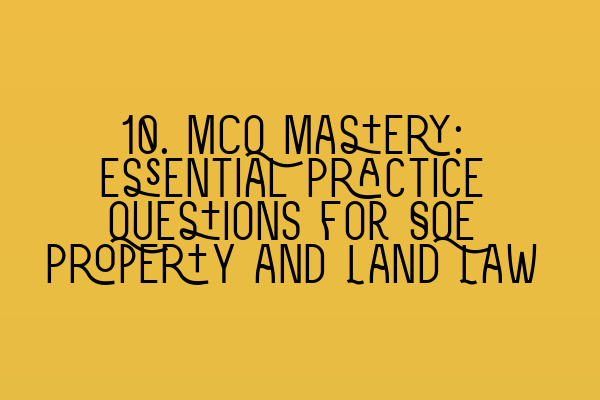Welcome to SQE Property Law & Land Law, the leading legal firm specializing in property and land law matters. In today’s blog post, we will delve into the world of Multiple Choice Questions (MCQs) for SQE Property and Land Law and provide you with essential practice questions to help you master this important aspect of the SQE exams.
Why are MCQs important?
MCQs are an integral part of the SQE exams and can greatly influence your overall score. They require you to carefully analyze the given options and select the most accurate answer. MCQs not only test your knowledge of the subject matter but also your ability to apply that knowledge in real-life scenarios.
By practicing MCQs, you can familiarize yourself with the exam format, learn to effectively manage your time, and identify any knowledge gaps that need to be filled before the actual exam. Additionally, practicing MCQs can boost your confidence, reduce anxiety, and improve your overall performance on the exam day.
10 Essential MCQ Practice Questions for SQE Property and Land Law
1. Which of the following is not a legal estate under English law?
a. Fee simple absolute in possession
b. Leasehold estate
c. Freehold estate
d. Chattel interest
2. Which of the following is not a freehold estate?
a. Fee simple absolute in possession
b. Life estate
c. Fee tail
d. None of the above
3. Which of the following estates can be inherited by the heir?
a. Life estate
b. Fee simple absolute in possession
c. Chattel interest
d. Leasehold estate
4. True or False: In English law, a leasehold estate can last indefinitely.
5. Which of the following is not a key element of a valid contract for the sale of land?
a. Offer and acceptance
b. Consideration
c. Intention to create legal relations
d. Capacity to contract
6. True or False: A mortgage is a legal interest in land.
7. Which of the following is not a legal requirement for adverse possession of registered land?
a. Possession must be without the owner’s consent
b. Possession must be continuous for at least 10 years
c. Possession must be open and visible
d. Possession must be hostile to the owner’s title
8. What is the purpose of a restrictive covenant?
a. To transfer the legal title in land
b. To restrict the use of land
c. To grant a leasehold estate
d. To create a legal charge on land
9. True or False: Rentcharge is an annual payment made by the tenant to the landlord under a lease.
10. Which of the following is not a registered interest in land under the Land Registration Act 2002?
a. Legal charge
b. Easement
c. Restrictive covenant
d. Equitable lease
We hope that these practice questions have tested your knowledge and provided you with valuable insights into the world of SQE Property and Land Law. Remember to practice regularly and seek further guidance if needed.
If you want to practice more MCQs or require additional preparation for the SQE exams, check out our related articles:
– SQE 1 Practice Exam Questions
– SQE 1 Practice Mocks FLK1 FLK2
– SQE 2 Preparation Courses
– SQE 1 Preparation Courses
– SRA SQE Exam Dates
At SQE Property Law & Land Law, we are committed to helping you succeed in your legal career. Our team of experienced solicitors is here to guide, support, and provide expert advice on all property and land law matters. Contact us today for all your legal needs.
